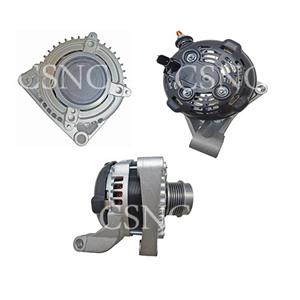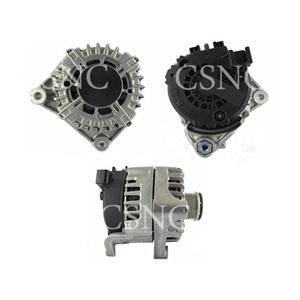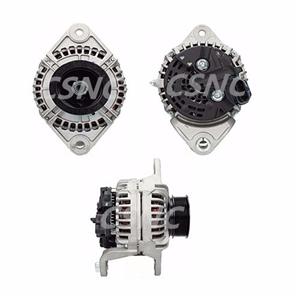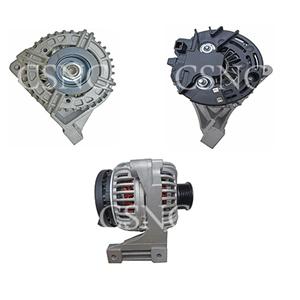The most common signs and causes of alternator problems
THE MOST COMMON SIGNS AND CAUSES OF ALTERNATOR PROBLEMS
It may be a small component, but the alternator plays one of the most critical roles in the operation of your car.
Not only does the alternator supply all the electricity needed to operate the lights, radio and heating, but it also charges the car battery which is integral in igniting the engine.
So if the alternator starts to fail, this can signal significant issues on the horizon for your car.
But how do you know that the alternator may be failing? What are the common signs that you may have alternator problems? And, what are the solutions to these alternator issues?
Luckily, alternator failure does have a variety of telltales signs which can help you spot the issue and find the solution before it causes any further significant issues. Below we will list each of the signs associated with alternator failure and then the potential causes of each issue.
No Charge
If your alternator has no charge, then it is clear something is drastically wrong with your system. Unfortunately, the reason your alternator is failing to charge could be down to a variety of issues. We’ve listed a few of general faults that could be causing your alternator to fail to charge below. Please keep in mind that this could be a sign of an overloaded alternator; an overloaded alternator renders the unit useless and you will need to buy a replacement.
- Loose or Missing Fan Belt
- Break in wiring
- Blown Fuse
- Blown Rectifier Diodes
Low Charge
While an alternator with no charge often suggests a severe issue, an alternator with low charge is a little more positive. Again, we’ve listed a few of the general faults that could be causing your alternator to fail to charge correctly. If fixing the below faults below do not work, please note you may have damaged a component within the alternator and may need to replace the unit.
- Loose Fan Belt
- Poor Wiring Connections
Overcharging
If the voltmeter on your vehicle’s dashboard starts to read an overly high voltage then you may have a problem with your alternator. Please keep in mind that it is normal for initial readings to start high and then settle back down. An overcharging alternator may be caused by the following.
- Poor Battery Condition
- Failed Regulator or Rotor
Noisy Alternator
The most common cause of a whining alternator is a worn out alternator bearing. This is often due to an overtightened fan belt wearing down the unit. Unfortunately, bearing replacement is a short-term fix and you may be better off replacing the unit entirely. Other issues that may be causing a noisy alternator include the following.
- Loose or Damaged Fan Belt
- Loose pulley
- Worn alternator bearing
No Warning Light
In general, if the charging system is working normally, the warning light should glow when the ignition is switched on and then extinguish when the engine is started. If the warning lights fails to illuminate when the ignition is turned on, this could be a sign that your alternator is playing up. This problem could be caused by one of the following issues.
- Blown Warning Light Bulb
- Poor Alternator Earth Connection or Broken Wire
- Relay Problem
Dim Warning Light
Similar to the above, if the charging system is working normally, the warning light should glow brightly when the ignition is switched on and then extinguish when the engine is started. If the initial warning light appears dim, this could be a sign that your alternator is at fault. Check for the following issues below.
- Loose Fan Belt
- Loose Wiring Plug
Continuous Light
If you get a continuous warning light, this could point to a whole host of potential mechanical issues. Generally, the issue will be with either the warning light circuit or the alternator. If it’s the latter, you may smell burning. Other issues that may cause a continuous warning light include the below.
- Poor Wiring Connection
- Loose Fan Belt
- Defective Alternator
The Most Common Cause of Alternator Failure
Did you know that out of all alternators fitted to cars, that over 85% will fail within 30 minutes of being fitted? This isn’t due to shoddy alternator design but is in fact due to shoddy mechanics not doing their job correctly.
So what are mechanics not doing correctly? Well, it all comes down to properly ensuring that the battery is fully charged. If the car battery is not charged, the alternator will fail to handle the vehicle's electrics and charge the flat battery. This is likely to result in an overloaded alternator. The rectifier will then blow and the unit will be rendered useless.
Always ensure the car battery is fully charged before replacing the alternator.
Are you replacing a broken or faulty alternator? Find out how you can contact us.
The Most Common Cause of Alternator Failure
Did you know that out of all alternators fitted to cars, that over 85% will fail within 30 minutes of being fitted? This isn’t due to shoddy alternator design but is in fact due to shoddy mechanics not doing their job correctly.
So what are mechanics not doing correctly? Well, it all comes down to properly ensuring that the battery is fully charged. If the car battery is not charged, the alternator will fail to handle the vehicle's electrics and charge the flat battery. This is likely to result in an overloaded alternator. The rectifier will then blow and the unit will be rendered useless.
Always ensure the car battery is fully charged before replacing the alternator. It may be a small component, but the alternator plays one of the most critical roles in the operation of your car.
Not only does the alternator supply all the electricity needed to operate the lights, radio and heating, but it also charges the car battery which is integral in igniting the engine.
So if the alternator starts to fail, this can signal significant issues on the horizon for your car.
But how do you know that the alternator may be failing? What are the common signs that you may have alternator problems? And, what are the solutions to these alternator issues?
Luckily, alternator failure does have a variety of telltales signs which can help you spot the issue and find the solution before it causes any further significant issues. Below we will list each of the signs associated with alternator failure and then the potential causes of each issue.
No Charge
If your alternator has no charge, then it is clear something is drastically wrong with your system. Unfortunately, the reason your alternator is failing to charge could be down to a variety of issues. We’ve listed a few of general faults that could be causing your alternator to fail to charge below. Please keep in mind that this could be a sign of an overloaded alternator; an overloaded alternator renders the unit useless and you will need to buy a replacement.
- Loose or Missing Fan Belt
- Break in wiring
- Blown Fuse
- Blown Rectifier Diodes
Low Charge
While an alternator with no charge often suggests a severe issue, an alternator with low charge is a little more positive. Again, we’ve listed a few of the general faults that could be causing your alternator to fail to charge correctly. If fixing the below faults below do not work, please note you may have damaged a component within the alternator and may need to replace the unit.
- Loose Fan Belt
- Poor Wiring Connections
Overcharging
If the voltmeter on your vehicle’s dashboard starts to read an overly high voltage then you may have a problem with your alternator. Please keep in mind that it is normal for initial readings to start high and then settle back down. An overcharging alternator may be caused by the following.
- Poor Battery Condition
- Failed Regulator or Rotor
Noisy Alternator
The most common cause of a whining alternator is a worn out alternator bearing. This is often due to an overtightened fan belt wearing down the unit. Unfortunately, bearing replacement is a short-term fix and you may be better off replacing the unit entirely. Other issues that may be causing a noisy alternator include the following.
- Loose or Damaged Fan Belt
- Loose pulley
- Worn alternator bearing
No Warning Light
In general, if the charging system is working normally, the warning light should glow when the ignition is switched on and then extinguish when the engine is started. If the warning lights fails to illuminate when the ignition is turned on, this could be a sign that your alternator is playing up. This problem could be caused by one of the following issues.
- Blown Warning Light Bulb
- Poor Alternator Earth Connection or Broken Wire
- Relay Problem
Dim Warning Light
Similar to the above, if the charging system is working normally, the warning light should glow brightly when the ignition is switched on and then extinguish when the engine is started. If the initial warning light appears dim, this could be a sign that your alternator is at fault. Check for the following issues below.
- Loose Fan Belt
- Loose Wiring Plug
Continuous Light
If you get a continuous warning light, this could point to a whole host of potential mechanical issues. Generally, the issue will be with either the warning light circuit or the alternator. If it’s the latter, you may smell burning. Other issues that may cause a continuous warning light include the below.
- Poor Wiring Connection
- Loose Fan Belt
- Defective Alternator
Are you replacing a broken or faulty alternator? Find out how you can contact us.
Irene@csncdq.com




